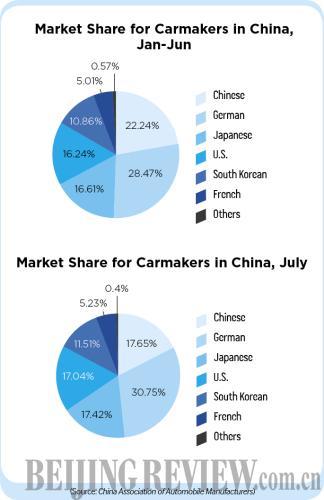|
To decide whether auto parts are overpriced, authorities tend to use a measurement technique, dividing what it will cost to buy all the parts of a car from dealers with the guide price of a finished car set by the carmaker. If this index surpasses 400 percent, it can be deduced that car buyers are being overcharged when purchasing auto parts.
It's not rare to see such cases in the Chinese market. According to a report jointly released in April by the Insurance Association of China and the China Automotive Maintenance and Repair Trade Association, the index for Mercedes-Benz C-Class W204 hit an eye-popping 1,273 percent.
Zhang Yu, Managing Director of Automotive Foresight, a consulting company, disclosed that the profit earned in China by some luxury carmakers by selling a car may be equivalent to that earned by selling 10 cars in other countries. Therefore, premium brands will bear the brunt of the wave of anti-trust investigations.
Shi Jianhua, Deputy Secretary General of China Association of Automobile Manufacturers, suggested that the relevant government departments are trying to further improve the Administration of Automobile Brand Sales Implementing Procedures, so as to effectively boost the healthy development of the automobile industry.
No protectionism
"All companies are equal in the eyes of the Anti-Monopoly Law. The law does not specially target foreign investors," said Shen Danyang, spokesman of the Ministry of Commerce, in response to a backlash to the investigations, with some opining that the Chinese Government is restraining the development of foreign enterprises.
Indeed, when the Anti-Monopoly Law initially came into force, China's first move was to target large domestic enterprises, as was the case in the investigations against telecom operators China Unicom and China Telecom in 2011 and alcohol makers Kweichow Moutai and Wuliangye starting at the end of 2012.
Shen said the recent anti-monopoly investigations concerning a number of foreign companies are to promote fair competition and protect consumers' rights. "Probes on monopolistic practices are universal
practices. Companies in China, no matter whether they are domestic or foreign, must bear the burden of legal responsibility if they violate Chinese laws."
Over the course of developed markets' evolution, there has been no lack of severe anti-monopoly cases in countries like the United States involving both native and outside companies. In September 2013, to give but one recent example, the U.S. Department of Justice announced that nine Japanese auto part suppliers including Hitachi Automobile, Mitsubishi Electric and Mitsubishi Heavy Industries had been fined $740 million for price manipulation.
With the ongoing round of anti-trust probes, the Chinese Government has shown its devotion to creating a favorable environment for both domestic and foreign companies to compete on an equal footing, while effectively protecting the interests and rights of Chinese consumers, said Shen.
Email us at: dengyaqing@bjreview.com

| 